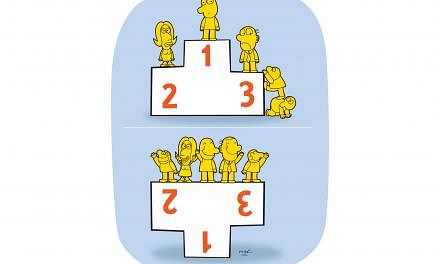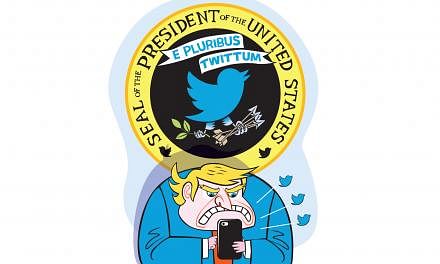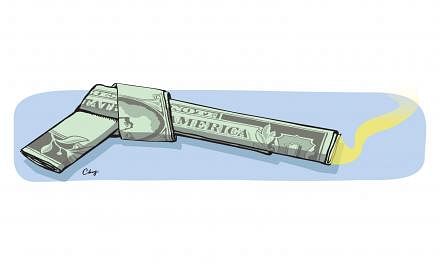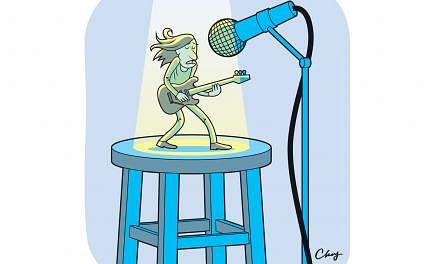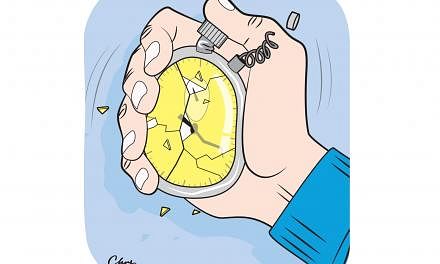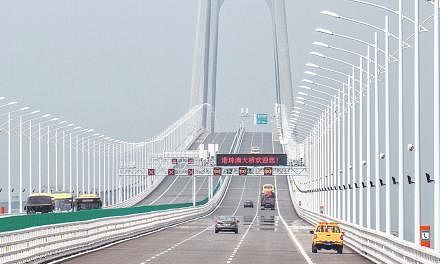All through this year and especially after the midterm election in November, a big question hung over the Trump administration: When special counsel Robert Mueller releases the findings of his investigation into Russian interference in the 2016 election, how politically damaging might they be?
1. Mueller's report in spotlight
All through this year and especially after the midterm election in November, a big question hung over the Trump administration: When special counsel Robert Mueller releases the findings of his investigation into Russian interference in the 2016 election, how politically damaging might they be?
The outcome of the probe, which has dogged the first half of Mr Donald Trump's term, may be the most anticipated event in domestic politics in 2019. The stakes are high. The findings could exonerate or discredit Mr Trump, who has begun his re-election campaign for 2020, and stir up talk of impeachment.
At the heart of the complex, sprawling probe is whether there were links between Russia and members of the Trump campaign, although Mr Mueller can also pursue matters that arise from these investigations.
So far, Mr Mueller has held his cards very close to his chest and given away very little about the targets of his investigation or the charges he may be preparing. Even the identity of a foreign company he is believed to be seeking to subpoena as a secret witness is unknown.
He is investigating Trump adviser Roger Stone over how much advance knowledge he had about WikiLeaks' plan to publish e-mails stolen by Russian hackers, and whether he had lied to lawmakers about his contacts with WikiLeaks, for which he could be indicted.
If indicted, Mr Stone would be the sixth Trump associate to be charged. Those already charged include former campaign chairman Paul Manafort and former national security adviser Michael Flynn.
Mr Mueller must submit a final report at the end of the investigation explaining why he charged the people he did, but it will be confidential.
While Mr Trump may try to bury it, Democrats will be raring to make the findings public. And now that they control the House, they can use their power of subpoena to force the administration to turn over the report and get witnesses, including Mr Mueller, to testify about their findings.
Mr Mueller may be able to subpoena Mr Trump to appear before a grand jury, though experts differ on whether the courts will allow this.
If Mr Trump is shown to have been aware of his associates' criminal activity, or to have obstructed justice, there will most certainly be calls for impeachment. But according to Justice Department guidelines, a sitting president cannot be indicted.
Thus far, Democrats, afraid of blowback from Republican voters in 2020, have been publicly cautious of moving ahead on impeachment.
2. Can anything stem the populism wave?
It is nothing less than a wave that has seized the Western world - a wave of populism that has a clearly defined enemy: Western liberalism.
It started with Hungary and Poland earlier this decade, and made its way to the United States, to the Slovak Republic, to Austria, Italy and the latest addition, to Brazil - to name only a few prominent examples.
In France, in spring last year, the right-wing populists were defeated in the runoff between the liberal Mr Emmanuel Macron and Ms Marine Le Pen of the Front National. In Britain, many think that the vote for Brexit in 2016 had its roots in a broad support for populist views. In Germany, the right-wing party Alternative for Germany (AfD) made it into Parliament for the first time in 2017 and immediately became the strongest opposition party.
Not long ago, liberalism was the dominant and undisputed world view. Today, hardly anybody would subscribe any more to this notion.
On the contrary, Western liberalism never before has come under so much pressure - and is now going through a time of gnawing self-doubt.
At the same time, populists are attacking the institutions that have been key to the structure of post-war Western societies: independent jurisdiction, free media and multilateral organisations.
The movements also share a deep disregard for social conventions, be it in language, behaviour or information. Due to the rise of social media, populists can circumvent the established media - disseminating their views unfiltered and unchecked.
Said Dr Jan Zielonka, professor of European politics at the University of Oxford in Britain and a self-proclaimed liberal: "Liberalism has become an ideology of power."
For Dr Zielonka "liberals have become illiberals" because he believes that liberals are imposing their school of thought on all the others - citing political correctness as an example. In the end, voters did not have a real choice any more, he said. "We were allowed to change governments, but not policies."
Similarly, political scientist John Mearsheimer, whose book The Great Delusion made waves this year, is also convinced that the liberal order is at least in part to blame for the rise of populism.
"After 1989 and the collapse of the communist bloc, the US wanted to make the world in America's image," Professor Mearshe-imer, a renowned academic from the University of Chicago, said recently while promoting his book in Germany. "The idea was: If all societies become liberal, then we will have peace and no human rights violations... Because liberal democracies who are economically dependent do not go to war with each other."
This assumption, however, is not shared by Prof Mearsheimer. "Liberal states are not peaceful by definition," he said.
For him, the current populist backlash, therefore, did not come as a surprise. "Nationalism and realism trump liberalism at every turn."
The coming year will provide more tests for the old world order but also opportunity - especially if leaders who rode the wave of populism to power fail to deliver on their promises.
Still, Dr Zielonka said a longer-term solution is needed for liberalism to thrive again: "We have to share our wealth - if we do not do that, everything will fall into pieces."
3. Cloud hangs over Brexit
Such is the anxiety and uncertainty surrounding Britain's departure from the European Union that the government in London has recently been forced to publicly deny rumours that families should stock up on food and medicines, or that people should not book holidays much beyond the next few months.
But alarmist scenarios aside, the reality remains that nobody - in either London or other European capitals - knows for sure how Brexit (as the process of Britain's separation from the EU is universally called) will affect the continent.
Even the date of Britain's departure, March 29, is still in doubt, although the date is written in law.
The chief explanation for this unprecedented mayhem is that the Brexit process unleashed a massive political storm in Britain, one which paralyses an entire ruling class and has led to a complete institutional meltdown in London.
How will 2019 unfold? A wide range of scenarios remains possible.
Chances that Britain will hold another referendum are growing, if only because this is the only way of breaking the political logjam. But it is less likely Britons will be offered an opportunity to reverse their decision to leave the EU than a fresh referendum on whether to approve the current Brexit deal.
And though the fear that Britain would simply crash out of the EU with no deal is on everyone's minds, the reality is that this is the least likely scenario, partly because most politicians in London know it would inflict incalculable damage on the British economy, but also because the EU fears the consequences of the ensuing mayhem.
It is far more likely that either the terms of the existing Brexit deal will be tweaked to get them through the London Parliament, or the EU nations will extend the Brexit negotiation period beyond March, giving everyone more breathing space.
Either way, the British and their European counterparts will discover their separation to be a lengthy process that will end up harming just about everyone.
Britain accounted for 17 per cent of the EU's operating budget and considerably more of Europe's military capabilities. The danger is its departure will not only marginalise the British, but severely damage the Europeans as well.
The omens are not good. The discussions on how to restructure the EU budget after the British are gone have barely begun, though they need to be completed by mid-2019. Talks on reforming the management of the euro currency have only skirted round the fundamental choices that have yet to be made. France's bid to reform the EU has already failed.
In 2019, the EU may discover that, although Brexit has diminished Britain, it will also diminish the Union. And that will not be a pleasant realisation for those European leaders who believe the EU will get a new lease of life after the British have departed.


